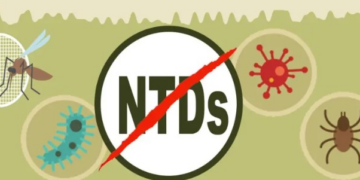Cholera, a food and water-borne disease, caused by the ingestion of the organism Vibrio cholerae in contaminated water and food, has claimed the lives of so many Nigerians in recent time.
For instance, the Nigeria Centre for Disease Control and Prevention (NCDC) said from January 1 to June 11, 2024, a total of 1,141 suspected and 65 confirmed cases of cholera with 30 deaths have been reported from 96 local government areas (LGAs) in 30 States of the Federation.
The Center revealed that the 10 states that contributed 90 per cent to the burden of cholera include Bayelsa, Zamfara, Abia, Cross River, Bauchi, Delta, Katsina, Imo, Nasarawa, and Lagos States.
The chief of the United Nations Children’s Fund (UNICEF), Lagos field office, Celine Lafoucrier, averred that in Nigeria, cholera is an endemic and seasonal disease, occurring annually mostly during the rainy season and more often in areas with poor sanitation.
Recurrent Cholera outbreaks critically affect children and populations at large, Lafoucrier lamented, adding that these vulnerable groups face substantial health risks, particularly those under age five who are prone to severe dehydration and higher mortality rates.
“Educational disruption is yet another critical consequence of cholera outbreaks, as illness and the need to care for sick family members lead to school closures and reduced attendance, hindering children’s learning and development. Similarly, post-recovery issues in children can include malnutrition, stunted growth, and weakened immune systems, increasing susceptibility to other diseases,” she posited.
These outbreaks underscore the urgent need for improved access to clean water and sanitation in many areas, the UNICEF’s chief advised, adding that, “Despite the state government’s efforts to provide water to its population, the current outbreak demonstrates the need for an urgent government focus on ensuring the water provided to the population is clean and risk-free.
“Addressing the challenges of cholera outbreaks requires a deliberate focus of state policies to provide high-standard water and sanitation facilities, as well as strengthened healthcare systems capable of responding to the demand in times of outbreaks, and state led educational campaigns on cholera prevention to protect children and the population at large.”
To alleviate cholera outbreaks, a comprehensive approach is essential, Lafoucrier advised, while explaining that a sustainable water, sanitation, and hygiene (WASH) infrastructure and strengthened health systems capable of anticipating epidemics as well as effective community engagement strategies were crucial to halt transmission.
“This includes enhancing water, sanitation, and hygiene (WASH) infrastructure, implementing rapid surveillance, promoting social mobilization, administering treatment, and utilizing oral cholera vaccines (OCV).
“Ultimately, preventing cholera centers on good sanitation and hygiene practices. Key actions include proper disposal of feces, eliminating open defecation, and ensuring access to potable water. Regular handwashing with clean, running water and soap is vital. Additionally, avoiding the consumption of uncooked vegetables, unwashed fruits, raw or undercooked seafood, and food from street vendors is important to reduce the risk of cholera infection,” she recommended.





